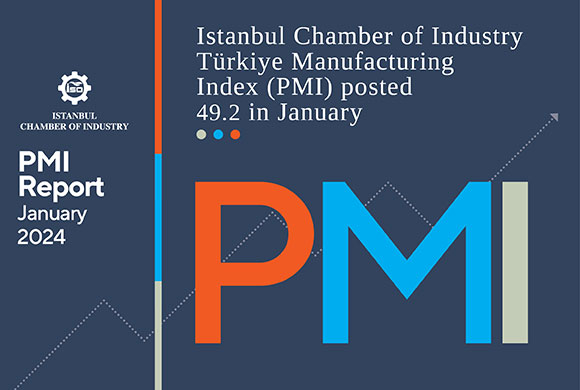News
ICI Released January 2024 ICI Türkiye Manufacturing PMI and Türkiye Sector PMI Report
- 01.02.2024
- News

The headline PMI increased to 49.2 in January from 47.4 in December, the highest reading in four months and signalling only a slight moderation in business conditions at the start of the year. That said, the health of the sector has now eased in seven consecutive months. The softer moderation of operating conditions matched the picture for output, which slowed to the least extent in six months.
According to the Istanbul Chamber of Industry Türkiye Manufacturing PMI survey data, new orders slowed down in all sectors except chemical, plastic and rubber products, with the sharpest decrease seen in clothing and leather products. Half of the ten sectors monitored started the New Year by expanding their staffing levels.
The January 2024 period of Istanbul Chamber of Industry (ISO) Türkiye Manufacturing PMI (Purchasing Managers’ Index) survey, which is the fastest and reliable reference accepted in manufacturing industry performance of the economic growth was announced. According to the survey results, where any figure greater than 50.0 indicates overall improvement of the sector, the headline PMI increased to 49.2 in January from 47.4 in December, signalling only a slight moderation in business conditions at the start of the year. Even though it was the highest reading in four months, the health of the sector has now eased in seven consecutive months.
The softer moderation of operating conditions matched the picture for output, which slowed to the least extent in six months. According to respondents, demand remained fragile but showed some signs of improvement in January. The ongoing fragility of demand was highlighted by a further easing of new business, extending the current sequence of moderation to seven months. New export orders also softened, albeit only slightly. Firms scaled back purchasing activity and inventory holdings in response to weaker new orders, but they kept staffing levels unchanged following a fractional increase in December.
The rate of input cost inflation accelerated sharply in January and was the fastest since last August. An increase in the minimum wage was widely mentioned by panellists, while higher raw material costs and currency weakness also reportedly added to price pressures. In turn, manufacturers raised their own selling prices at a marked pace, with the rate of inflation quickening to a five-month high. Suppliers' delivery times lengthened in January, following a slight shortening in December. Longer lead times in some cases reflected delays with shipping caused by issues in the Red Sea.
DATA SHOWS A SOLID START TO THE YEAR
Commenting on the Istanbul Chamber of Industry Türkiye Manufacturing PMI survey data, Andrew Harker, Economics Director at S&P Global Market Intelligence, said: "There were some positive signs in the latest PMI figures for Türkiye, with rates of moderation generally easing. The historical relationship between the PMI data and official industrial production data suggests a solid start to the year .
Manufacturers did face some headwinds, however. A rapid acceleration in cost inflation fed through to much higher output prices, acting to limit demand. Meanwhile, the shipping issues in the Red Sea caused disruption to supply chains, which had shown an improvement at the end of 2023.”
PRESSURES ON DEMAND AND PRODUCTION
Istanbul Chamber of Industry Türkiye PMI Manufacturing report pointed out the sharp acceleration in inflation at the beginning of the year due to the increase in raw material costs and the depreciation of the lira, as well as the effect of the minimum wage increase. Demand and output were under pressure in January, while growth was limited only to the chemical, plastic and rubber products sectors. On the employment side, more positive developments came to the fore and five out of ten sectors increased their staffing levels. Input costs saw significant increases throughout the manufacturing industry in January. Inflation accelerated in all sectors except non-metallic mineral products. The sharpest price increase was recorded in land and sea vehicles, while the lowest inflation occurred in base metals sector. The fastest increase in sales prices in January was again in land and sea vehicles, and inflation in this sector reached its highest level in the last five months. The slowest increase on the other hand was recorded in non-metallic mineral products. Finished product prices increased faster than December in all sectors.
Manufacturers faced a challenging demand environment at the beginning of 2024. New orders slowed down in all sectors except chemical, plastic and rubber products, with the sharpest decrease seen in clothing and leather products. There was a more positive outlook on the foreign demand side. New exports and new orders increased in four sectors, and the fastest expansion was in machinery and metal products. In January, growth in output was limited to the chemical, plastic and rubber sector as it was in total new orders. The most significant slowdown in output was recorded in non-metallic mineral products. Half of the ten sectors monitored started the New Year by expanding their staffing levels. Food products increased their number of employees for the first time in the last four months. On the other hand, the most significant employment loss was seen in clothing and leather products companies.
LEAD TIMES LENGTHENED IN 7 OUT OF 10 SECTORS
Suppliers' delivery times lengthened in 7 out of the 10 sectors monitored in January due to the delays with shipping caused by issues in the Red Sea. The most significant increase in delivery times was seen for chemicals, plastic and rubber products. The delays in deliveries occurred despite a widespread reduction in purchasing activity. Purchasing volume decreased in eight of the ten sectors.
*You can find attached the Istanbul Chamber of Industry Türkiye Manufacturing PMI and Sector PMI January 2024 reports.